Nothing spells plot like an independent trader plying the spacetime lanes in search of profit, in a world very much skewed against the little guy. Nothing, that is, unless one adds family! Now in addition to scrabbling after profit, one has extra motivation: failure isn’t merely an individual catastrophe. Bad judgement, terrible luck, or the machinations of a vast inhuman corporation could drag one’s whole family down into poverty…or worse.
Consider these five novels of cosmos-spanning family trade.
The Rolling Stones by Robert A. Heinlein (1952)
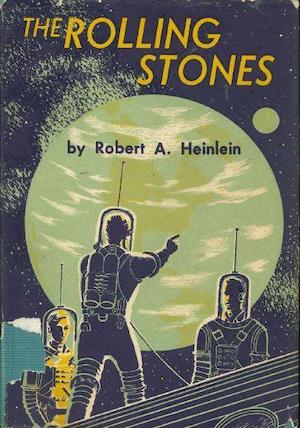
Believing with good reason that it would be disastrous to allow his bright but undisciplined sons Castor and Pollux to pursue their dream of the week (haring off to Mars on an interplanetary trading venture of questionable legality), writer Roger Stone transforms the venture into a family outing. It’s not the adventure the twins wanted but it’s the one they get.
The spacecraft Rolling Stone sets off with a family crew: dad Roger, mom Edith, sister Meade, brother Buster, the twins, and grandmother Hazel. Will the twins’ bright idea turn a profit? Perhaps that’s not the only thing to consider: Not only is trade more complicated than either twin cares to acknowledge, space is an unforgiving environment and it is all too easy for greenhorns to make a fatal mistake.
“The Horn of Time the Hunter” by Poul Anderson (1963)
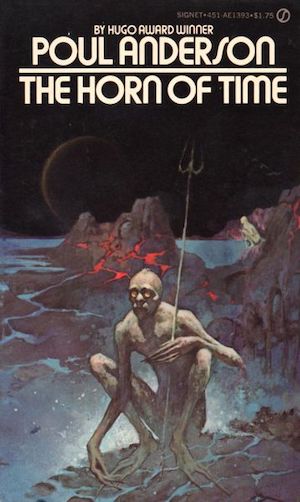
Near-light speed travel and time dilation guarantee that interstellar traders will become alienated from planetary cultures. Solution? Bring their families with them on their travels. Distinct cultural groups make convenient scapegoats, and the Golden Flyer purchased its own safety by betraying their fellow Kith, a crime for which the Kith Council banished ship and crew far beyond the borders of human space. Now, twenty thousand years later, the Golden Flyer returns to discover what time has done with humanity.
Ruins on the first world they explore suggest that humanity’s run may be over.
Chanur’s Venture by C. J. Cherryh (1984)
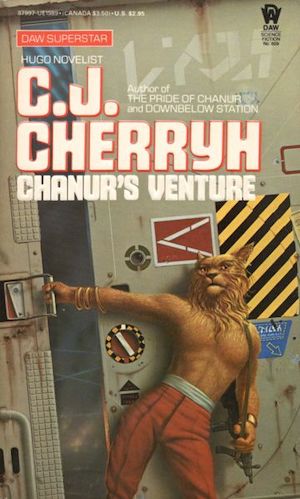
Two years after rescuing the human Tully1 from the Kif, Pyanfar Chanur’s trading vessel The Pride of Chanur has not reaped the expected benefits of trade with humans. Instead, the chaos that followed the rescue has made the ship something of a pariah, which is never a plus for trade. Tully’s reappearance may herald the long-delayed payoff for Pyanfar’s act of charity towards the hairless ape.
More likely, it signals that Pyanfar and her hapless crew are about to be dragged into interstellar politics even more complex and fraught than their first adventure.
Fortuna by Kristyn Merbeth (2019)
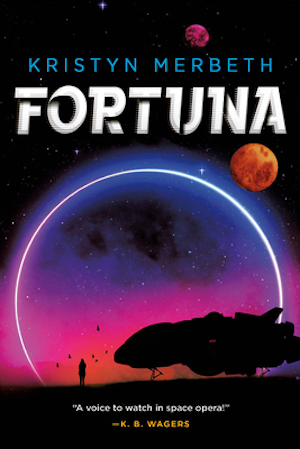
Having escaped doomed Earth for the Nova Vita system, humanity’s last remnants wasted little time establishing mutually hostile colonies. Each planet in the red dwarf system views the others with poorly concealed (sometimes open) paranoia. This presents an opportunity for Mama Kaiser and her children, each born on a different world. Their Fortuna plies the space lanes between worlds, acting as intermediary for worlds unwilling to deal directly with each other. Aware that the system is edging towards open war, knowing that middlemen often make convenient scapegoats, Mama Kaiser always has an eye out for the Big Deal that will provide enough money to insulate her family from ill fortune. There are three problems with this strategy:
- There isn’t enough money to protect the family if war actually comes.
- The Big Deal itself may be what drags the Fortuna into the line of fire.
- There is no plan so perfect that Mama Kaiser’s daughter Scorpia cannot somehow f*** it up beyond all recognition.2
The Bloodline Feud by Charles Stross (2013)
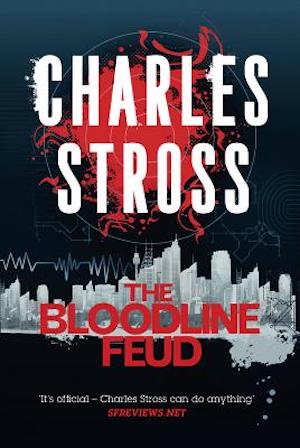
Many children dream of discovering they are lost royalty. Thanks to a box of memorabilia from her birth mother, orphan Miriam discovers that for her, this is in a sense true. Her blood relatives, the Clan, are possessed of a remarkable genetic gift that lets them step from one parallel world to another. The catch? The Clan’s roots are in a feudal society. They see no need to heed local law if it would impede the accumulation of wealth. Warnings that their policies are short-sighted and doomed to failure fall on deaf ears. Worse, the Clan is losing an interdimensional war it has no idea it is fighting, a war in which Miriam is very much a target.
***
I am always interested to learn of new works in this subgenre. If there are any you feel deserve more attention, please mention them in the comments.
In the words of Wikipedia editor TexasAndroid, prolific book reviewer and perennial Darwin Award nominee James Davis Nicoll is of “questionable notability.” His work has appeared in Publishers Weekly and Romantic Times as well as on his own websites, James Nicoll Reviews and the Aurora finalist Young People Read Old SFF (where he is assisted by editor Karen Lofstrom and web person Adrienne L. Travis). He is a four-time finalist for the Best Fan Writer Hugo Award and is surprisingly flammable.
[1]Like many male protagonists featured on book covers, Tully looks remarkably like Michael Whelan. Whelan is apparently destined to be the future’s answer to those profligate patriarchs Niall of the Nine Hostages (https://en.wikipedia.org/wiki/Niall_of_the_Nine_Hostages) and Genghis Khan (https://www.smithsonianmag.com/smart-news/other-men-who-left-huge-genetic-legacies-likes-genghis-khan-180954052/)
[2]Just in case you were wondering what an antiquated acronym (FUBAR) might mean. It’s WWII military slang: https://en.wikipedia.or/wiki/List_of_military_slang_terms










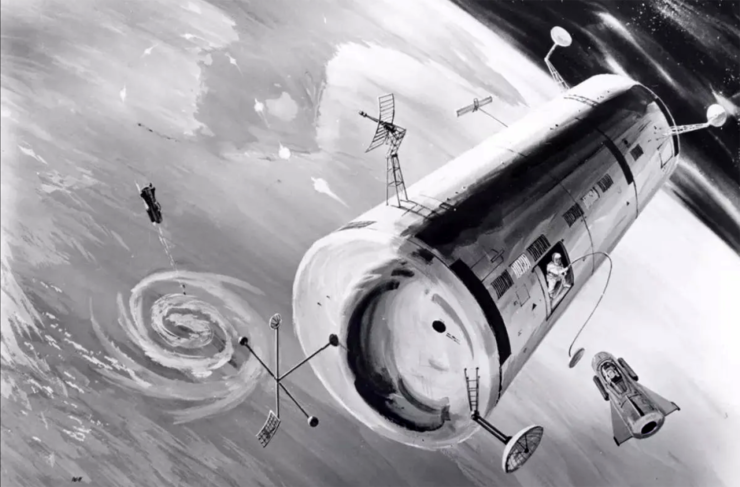
Elizabeth Moon’s “Vatta’s War” series is quite good too. A young woman who’s family is part of an interstellar trading empire goes from being kicked out of the space academy to become a captain of a family ship on a simple milk run. Through a great 5 book series she winds up leading an alliance against a vast conspiracy that includes space pirates, political backstabbing, etc. It begins with “Trading in Danger.”
I reviewed the Vatta books on my site a year ago and was a bit surprised to discover my memory of the series left out the first book. Maybe because I think of the series as MilSF and the first book is more about trading.
Really? No Rolling Stones joke? Too easy, I guess.
So, what footnote 1 tells me is that in the future a not insignificant portion of humanity will resemble a cross between Michael Whelan and Carol Emshwiller. Since Ed Emshwiller put himself in not a few illustrations as well, I guess a lot of people will look like their actual kids, too.
Does the crew of Serenity count as a ‘found’ family?
@1 “Vatta’s War” is in general more about the war then trade. But there is a short Vatta story “Say Cheese” published in “Moon Flights” which is very much about trading.
And if we talk about trade we should not forget the whole Liaden Universe by Sharon Lee & Steve Miller. Some volumes are more trade-y then other, but it is always there.
The whole Liaden series by Sharon Lee and Steve Miller involves a lot of interstellar trade as a family (or clan) business. Though the series involves a lot of action, some romance and star spanning conspiracies, trade is always a major component.
Some are more trade focused then others – in Alliance of Equals, the clan’s master trader seeks to create new trade routes to assist the clan after they have been kicked off their home world.
Really disappointed not to find Sharon Lee and Steve Miller’s “Jethri books” mentioned here. We begin by meeting Jethri as the youngest member of the Gobelyn family on the family-run trade ship Gobelyn’s Market (an intentional pun by the authors), but proceed to find out he’s a bit more than that. The first book is Balance of Trade, the next is Trade Secret, and the third—which will be released in May—is titled Fair Trade. All these books are self-contained and yet all contribute toward universe-building that extends to 23 books and almost 60 shorter works.
*I see Spriggana and Christyjoy Skaw posted while I was proofreading mine! Yes, the entire universe involves a lot of trade!
I know you have a policy of not repeating authors on a list, but the chapters in which Thorby is adopted into the Free Traders in Heinlein’s Citizen of the Galaxy would qualify for a spot.
What astonishes me about this trope is how ubiquitous it was from the 1950s through the 1970s and early 1980s…and then vanished after Cherryh.
It inspired the Traveller RPG, along with the Dumarest of Terra books…and feel so completely out of fashion that even Cherryh kind of only begrudgingly put it into the Bren-Cameron-solves-problems-with-the-Atevi series at editorial behest, then made it very clear that, no, it is not the Alliance-Union universe 9 books in.
It’s sort of making it’s way back into fashion, but wider knowledge of commodity futures trading and containerized shipping makes “found family doing UPS in spaaaaaaaaaace” harder to pull off as a setting trope.
While not *about* trading, the problems of light speed interstellar trade of IP are woven deeply into Neptune’s Brood by Stross. Including travel by beaming your assembly instructions via laser, along with enough slow money to make it worth someone’s time to print your body at your destination.
I’m now picturing how that would run in Cherryh’s A-U universe, which already had ethical problems with clones, brain taping and break-bulk cargo shipped by FTL drives.
Aetherbound by E.K. Johnston is a new YA that uses this trope! The main character is born into one of these families and ends up escaping.
Richard McEnroe’s now venerable The Shattered Stars setting is one where basic economics strongly favours large shipping companies over the little guys, which is too bad for the protagonists, crew on an independent trader spiralling into inevitable bankruptcy.
(the book also provides an explanation as to why the government might turn a blind eye to the technically illegal psionics institutes)
@7,@8 You beat me to the punch. The Liaden universe is the best!
Poul Anderson also gave us master traders Nicholas van Rijn and David Falkayn, which kind of counts as family, since David eventually married Nick’s daughter.
It’s depressing when great authors like Poul Anderson’s books are out of print and not available electronically.
Oh well. Ebay here I come.
Huh. I thought I posted this: there are lots of Anderson ebooks out there. SF Gateway has a couple of dozen, Open Road Media more than 40, NESFA more than half a dozen and no doubt there are others I am overlooking.
fcoulter – try AbeBooks. They are my go-to for old books and they usually have what I want at a relatively decent price. Also, I use them even for relatively new books. Would rather support sellers on there than the Amazon beast…
Regarding Moon’s Vatta War and whether it’s Military SF and doesn’t merit inclusion here. I personally found the military side of it surpisingly feeble or secondary or whatever, compared to the trading side. Heck, even the cloak and dagger stuff was beefier than the purely military stuff.
@17 I have terrible news: Amazon owns AbeBooks.
I’m a bit surprised that Heinlein’s Citizen of the Galaxy is not included here. But this is a good selection, anyhow.
What about the Qeng Ho of A Deepness in the Sky? They’re not one family, but a bunch of them marrying back and forth across the centuries.
@10 – Yes, it was once an incredibly common theme in SF. I recently re-read the original “Foundation” Trilogy (for the first time since my early teens) and one of the many aspects I’d long since forgotten was the substantial role that traders play in the books. It certainly wasn’t a plot element I’d normally have associated with Asimov.
My question though is – just why was it such a popular theme? If I had to guess I’d say it ties in with classic Campbellian ideas; an expansionist humanity taking Western capitalism to the stars and all those alien races that didn’t previously realise that they needed all our useless crap – errr, I mean our valuable, indispensable goods and technology. The emphasis on the small, independent hands-on traders as the good guys – as opposed to the big, rapacious faceless corporations – was also consistent with the general philosophy of writers like Heinlein and Anderson. I’d be interested in any other views as to the reasons for its popularity, though.
As for why it dropped in popularity – it may be that by the ‘80s many writers and readers were a bit more cynical about the concept of heroes whose prime motivation was screwing over the locals for profit, regardless of how charmingly they may do so. Increased real-world evidence that those big, faceless rapacious corporations were much more prevalent in trade than charming, ethical mom & pop operations probably didn’t help either.
Still, the theme managed to produce a lot of entertaining fiction. The “Solar Queen” series, about one of those doughty little independent traders, are about my favourite Andre Norton novels.
People longing for trade-based adventures could do worse than to purchase a copy of the Traveller roleplaying game, in which playing a middle-aged star trader juggling massive debt and operating costs is a very real option.
Angel Station by Walter Jon Williams
@15: Baen ebooks have a lot of Poul Anderson’s books. Certainly not all (given how many he wrote), but they do have the Nicholas van Rijn and David Falkayn books.
The Solar Clipper Trader’s Tales, by Nathan Lowell; plus associated other series. Actually that main series is mostly on commercial trader’s, though we meet people from family ships, and even take one voyage on one. But family traders are definitely a thing in the universe. Loads of fun, too, if you don’t start cross-comparing ship dimensions, cargo weights, and grav pallet capacity (and deck strength).
I’m not sure if the Foundation traders were family ships? I thought they were more just a bunch of cigar-chomping instigators operating under the cover of commerce.
Cherryh also had quite a few human merchant families in the Alliance/Union universe, as particularly evinced in Merchanter’s Luck, Tripoint and Finity’s End. (And why, oh why, aren’t the latter two available as eBooks?)
Well, the good news is I found an ebook of Tripoint. The bad news, it’s in German, which I do not speak or read.
@13: Alan, it was your review of Agent of Change that introduced me to that universe—correction: those universes <g>— in the Liaden books.
@29 Glad to be of service. I love introducing people to my favorite books.
driveby @@@@@ 19 – seriously!!?!?! UGH
…now I need to find another way to get my old books I suppose. Sigh.
WH40K Rogue Traders.
Scalzi’s Collapsing Empire series may not focus on them initially, but it does contain trading families that form the backbone of an empire’s population support.
@3: Yeah, I was hoping for a Rolling Stones joke too, but you can’t always get what you want.
I’ll get my spacesuit.
Nathan Lowell’s series about Ishmael Wang, the Golden Age of the Solar Clipper has space trade ships, both family ships and non-family commercial conglomerate ships as the primary setting for Ishmael’s career from cook’s assistant to owner of his own trading ship.
Thanks for featuring Chanur’s Venture, but all 5 books in the series are great. In addition to the trading angle, they take a really thoughtful look at gender and sexism, and the final one is really funny, which we all deserved after being terrified for 4 books solid. I read them as they came out, and was thrilled to find ships crewed by women with mustaches, claws and serious teeth, as well as impressive earrings.
Rob Greene’s THE LIGHT YEARS…bonus, it has arranged marriage and blandly bisexual *men* in it.
I Tell All here.
@10: then made it very clear that no, it is not the Alliance-Union universe 9 books in. How so? ISTR that A-U was one direction to leave Terra; the hani homeworld is another, and the atevi world is another (and/or further out), out of all the directions one could go.
For those who like Cherryh, check out Artifact Space by Miles Cameron, which evokes both the trader idea (although not families as such, because the main character is the last member of her Family) and the sort of paranoia from having limited facts that Cherryh does so very well.
@38: The physical experience of FTL in the Foreigner books is completely different from that in the A/U books.
DG @39
Yeah Miles Cameron new series is another milSF which is more about trading than fighting it seems. I’m re-reading Artifact Space right now. I have to say that famililies do come into it, e.g. Drake, and there are surviving members of the main character’s clan which are likely to be relevant in the future.
Evening’s Empires by Paul McAuley – thought not sure if it counts if most of the family are killed off right at the start of the book :)
@40: is the difference in drives because they’re different universes, or different times? The latter seems less likely given that the experience is similar in both the A-U era and the Faded Sun books (which IIRC are some millennia later) — but the difference is also made clear in book 5, rather than book 9.
Heinlein’s Rolling Stones are the first example that came to my mind too. I’ve always wondered though why RAH had so many thoughts about “bad” (ie: irresponsible and/or neglectful) parenting. Was there something in his personal life that prompted this?
For Stross’ Bloodline Feud, I’m not really sure I’d consider this “interplanetary” per se. After all they are trading between Earth and Earth :) I really like the latest books in the series where they take the character of paranoid techno-thriller. Just checked my library hold status and I’m next in line for Invisible Sun, yay!
@6,@7,@13,@29 so happy to see so much love for the Liaden series – I particularly love that in one of the more recent books “Accepting the Lance” the plot turns on whether they can get the planetary trade port recertified and somehow they made it exciting?! One of the things I like about the Liaden books is they at least try to think about the economics – about luxury cultural items vs bulk goods and how to construct a profitable trading loop.
@22,@31 I also thought of Scalzi’s Interdependency series, with its mercantile family monopolies, and which somehow manages to be both exploitative and ultimately hopeful. It gets around some of the issues with interstellar trade as the system is more about political control than economic necessity.
@24: Yeah *Angel Station* was one of the first to occur to me.